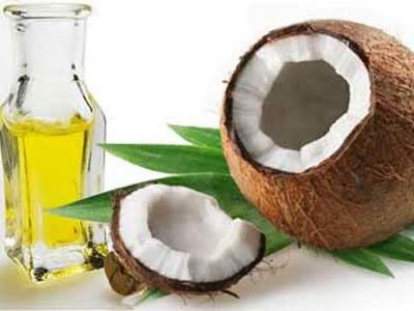Coconut oil nourishes the skin
Many commercial skin moisturizers contain petroleum based ingredients which are toxic to the body, as well as fragrance and artificial colors which offer no true benefits to your skin. Coconut oil is a healthier alternative.
Coconut oil contains 3 fatty acids: capric acid, caprylic acid and lauric acid, all of these fatty acids kill candida, which is a common cause of fungal infections. Coconut oil also contains vitamin E which is soothing to the skin in cases of sunburn, eczema and psoriasis. When applied to your skin, coconut oil will help to reduce the appearance of wrinkles and fine lines and smooth your skin.
Coconut oil and herbs
You can use coconut oil in its original form or you can give it a serious boost and increase its effectiveness by infusing the oil with herbs. The advantage to making your own body oil is the ability to customize it to your own needs. The herbs listed below is certainly not all inclusive, but it offers numerous benefits to help ease eczema, psoriasis, sunburns and other skin conditions.

Herb Options
Arnica flowers: Well-known herb for bruises, bunions, strains, sprains, arthritis, and muscle pain.
Burdock root: For psoriasis and eczema.
Calendula flowers: Useful for a wide variety of skin irritations and conditions including insect bites, rashes, scrapes, abrasions, cuts, inflammations, and much more.
Chickweed: Soothing, helps with skin conditions including psoriasis, eczema, minor burns, rashes, and other skin irritations.
Comfrey leaf and/or root: Assists with a wide variety of conditions including sprains, eczema, dermatitis, viral skin infections, arthritis, wounds, and bruises.
Ginger root: Warming, useful for arthritis and sore muscles.
Goldenseal leaf and/or root: Antibacterial and anti-inflammatory properties, useful for numerous skin conditions.
Lavender flowers: Soothing, calming, has healing properties beneficial for numerous skin conditions.
Plantain leaf: Antibacterial, antimicrobial, anti-inflammatory, and antitoxic properties. Helps relieve and soothe insect bites and stings, poison ivy, itching, rashes, sores, bruises, blisters, and damaged skin.
St. John’s Wort: Anti-inflammatory and astringent properties. Beneficial for bruises, swelling, insect bites and stings, scrapes, rashes, burns, and pain.
Thyme: A strong antiseptic used for cuts, scrapes, and sore muscles.
How to Infuse Oil
There are two options to infuse oil, a quick method ready in 3-5 hours or a slow method ready in 2-6 weeks. Both options are described below, so you can choose that method that works best for you.
Quick Method:
1. Add 1 cup of oil to a saucepan, allow to melt. Add in approximately 1 to 2 ounces of dried herbs. Place on stovetop.
2. Keep the burner at the lowest possible temperature for 3-5 hours, until the oil takes on the color and scent of the herbs.
3. Line a strainer with cheesecloth or muslin and place over a bowl. Pour oil into the strainer.
4. Squeeze or press the herbs to remove all of the oil.
Be sure to place in a dated and labeled airtight jar. Infused body oil will last approximately one year if stored properly.
Slow Method:
If you are not in a rush, you can simply add your herbs and oil to a glass jar and allow the heat of your home to infuse the oil for you.
Directions:
1. Place dried herbs in a clean dry glass jar.
2. Cover herbs with melted coconut oil, the oil should be 1-2 inches above the herbs.
3. Cap your jar tightly and place somewhere warm, but not in direct sun.
4. Gently shake the jar at least once a day.
5. If the herbs absorb all of the oil, add more oil so they are completely covered.
6. Soak herbs for 2-6 weeks until the oil takes on the color and scent of the herbs.
7. Line a strainer with cheesecloth or muslin and place over a bowl. Pour oil into the strainer.
8. Squeeze or press the herbs to remove all of the oil.
Be sure to place in a dated and labeled airtight jar. Infused body oil will last approximately one year if stored properly.
Where to buy coconut oil and herbs
Always use organic extra virgin coconut oil. This type of oil is available online and in many health food and grocery stores.
Do not buy a coconut oil that has been hydrogenated, bleached, refined or deodorized.
Be sure to use only organic herbs. I also prefer to buy from companies that offer lab analysis on their herbs for heavy metals, pesticides and herbicides.
References:
Rosemary Gladstar’s Medicinal Herbs: A Beginner’s Guide: 33 Healing Herbs to Know, Grow, and Use
Rosemary Gladstar’s Family Herbal: A Guide to Living Life with Energy, Health, and Vitality
http://www.ncbi.nlm.nih.gov/pubmed/19134433 Novel antibacterial and emollient effects of coconut and virgin olive oils in adult atopic dermatitis.
http://www.ncbi.nlm.nih.gov/pubmed/23746224 Development and anti-microbial potential of topical formulations containing Cocos nucifera Linn.
http://www.ncbi.nlm.nih.gov/pubmed/20523108 Effect of topical application of virgin coconut oil on skin components and antioxidant status during dermal wound healing in young rats.
http://www.ncbi.nlm.nih.gov/pubmed/19387482 Antimicrobial property of lauric acid against Propionibacterium acnes: its therapeutic potential for inflammatory acne vulgaris.
http://www.indianpediatrics.net/sep2005/877.pdf Oil Massage in Neonates: An Open Randomized Controlled Study of Coconut versus Mineral Oil
http://www.ncbi.nlm.nih.gov/pubmed/10204088 Uptake of vitamin E succinate by the skin, conversion to free vitamin E, and transport to internal organs.








